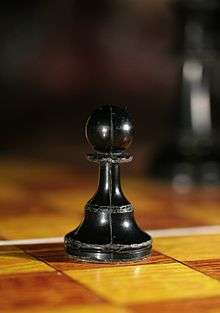pawn
English
Pronunciation
- (UK) IPA(key): /pɔːn/
- Rhymes: -ɔːn
- (US) IPA(key): /pɔn/
- (cot–caught merger) IPA(key): /pɑn/
- (Southern American English) IPA(key): /pɑɒn/
- Homophone: porn (non-rhotic accents)
Etymology 1

A black pawn in chess
From Middle English pawn, pown, pewne, poune, powne, paun, from Anglo-Norman paun, poun (“pawn, pedestrian”) ( = Old French poon, päon, pëon), from Late Latin pedō, pedonis (“footsoldier”), from Latin pēs, ped- (“foot”). Doublet of peon.
Noun
pawn (plural pawns)
- (chess) The most common chess piece, or a similar piece in a similar game. In chess each side has eight; moves are only forward, and attacks are only forward diagonally or en passant.
- (colloquial) Someone who is being manipulated or used to some end.
- Though a pawn of the gods, her departure is the precipitating cause of the Trojan War.
Synonyms
- See also Thesaurus:pawn
Translations
chess piece
|
|
someone who is being manipulated
|
See also
| Chess pieces in English · chess pieces, chessmen (see also: chess) (layout · text) | |||||
|---|---|---|---|---|---|
| king | queen | castle, rook | bishop | knight | pawn |

- Appendix:Chess_pieces
Etymology 2
From Middle French pan (“pledge, security”), apparently from a Germanic language (compare Middle Dutch pant, Old High German pfant).
Noun
pawn (plural pawns)
- The state of being held as security for a loan, or as a pledge.
- All our jewellery was in pawn by this stage.
- Shakespeare
- My life I never held but as a pawn / To wage against thy enemies.
- An instance of pawning something.
- Shakespeare
- Redeem from broking pawn the blemish'd crown.
- John Donne
- As the morning dew is a pawn of the evening fatness, so, O Lord, let this day's comfort be the earnest of to-morrow's.
- Shakespeare
- (now rare) An item given as security on a loan, or as a pledge.
- 1621, Democritus Junior [pseudonym; Robert Burton], The Anatomy of Melancholy, Oxford: Printed by Iohn Lichfield and Iames Short, for Henry Cripps, OCLC 216894069; The Anatomy of Melancholy: […], 2nd corrected and augmented edition, Oxford: Printed by John Lichfield and James Short, for Henry Cripps, 1624, OCLC 54573970, (please specify |partition=1, 2, or 3):, New York, 2001, p.106:
- Brokers, takers of pawns, biting userers, I will not admit; yet […] I will tolerate some kind of usery.
- Francis Bacon
- As for mortgaging or pawning, […] men will not take pawns without use [i.e. interest].
-
- (rare) A pawnshop, pawnbroker.
Translations
instance of pawning something
item sold to a pawn shop
(rare) type of shop
|
|
Verb
pawn (third-person singular simple present pawns, present participle pawning, simple past and past participle pawned)
Synonyms
- (to deposit at a pawn shop): hock
Translations
give as security for loan
|
See also
Etymology 3
Noun
pawn (countable and uncountable, plural pawns)
- Alternative form of paan
- 1832, Meer Hassan Ali, Observations on the Mussulmauns of India
- A tray filled with pawns, prepared with the usual ingredients, as lime cuttie (a bitter gum), betel-nut, tobacco, spices, &c.
- 1892, Chambers's Journal (volume 69, page 320)
- To our English taste, pawn is very offensive; but the natives of India relish it, and regard it as a necessity. It is much eaten by Mohammedans of both sexes, and by the natives of Bengal.
- 1832, Meer Hassan Ali, Observations on the Mussulmauns of India
Etymology 4
Etymology 5
Verb
pawn (third-person singular simple present pawns, present participle pawning, simple past and past participle pawned)
- (video games) Alternative form of pwn
Anagrams
This article is issued from
Wiktionary.
The text is licensed under Creative
Commons - Attribution - Sharealike.
Additional terms may apply for the media files.